| Article ID | Journal | Published Year | Pages | File Type |
|---|---|---|---|---|
| 7247288 | Journal of Vocational Behavior | 2018 | 14 Pages |
Abstract
This research draws on self-determination theory to investigate (a) the role of cooperative psychological climate in promoting harmonious work passion among employees with low intrinsic motivation; and (b) the mediating role of harmonious passion in linking cooperative psychological climate to behavioral outcomes. We propose that cooperative psychological climate facilitates harmonious passion and, in particular, plays a compensatory role among employees with low intrinsic motivation. In turn, harmonious passion is expected to facilitate both task performance and interpersonal helping, thereby linking cooperative psychological climate to these employee behaviors. We test the model using data from employees and their supervisors across two countries (Singapore and Brazil) and find cross-national evidence that cooperative psychological climate compensates for low intrinsic motivation to predict harmonious passion. Harmonious passion also positively predicts task performance and interpersonal helping, but only in the Brazilian sample. This research enriches the nomological network of harmonious passion, provides an alternative pathway to driving employee passion when intrinsic motivation is lacking, and underscores the value of considering the joint roles of passion predictors so as to reap the performance benefits of harmonious work passion.
Related Topics
Social Sciences and Humanities
Business, Management and Accounting
Marketing
Authors
Violet T. Ho, Dejun Tony Kong, Chay-Hoon Lee, Philippe Dubreuil, Jacques Forest,
